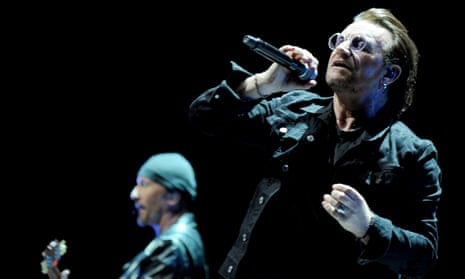No matter their stature, most rock gods eventually realise that the concert-going public no longer want new music, just classics and the greatest hits. U2 seemed to finally bow to this inevitability last year, when they toured The Joshua Tree, the 1987 album that made them the biggest band in the world. However, as bassist Adam Clayton explained recently, playing the whole album in fact freed them from its shadow: “If you wanted those songs, it’s done.” Hence the present Experience + Innocence tour, on which the Dublin four-piece shun their best-loved album in favour of an adventurous 24-song setlist, including seven songs from last year’s Songs of Experience, and take a self-deprecating, sideways look at their long career.
It is also the most visually spectacular outing yet for a band who have previously toured with a mirrorball lemon and a giant claw. An enormous “barricage”, the length of the arena, bombards the crowd with imagery before the band are suddenly revealed to be playing inside it, behind the screens. In the show’s most eye-popping moments, U2 rock on beneath arena-sized pixelated images of themselves.
It only relents as a spectacle when they play early songs Gloria and I Will Follow on a conventional stage, dressed in post-punk black, with minimal lighting, and Bono remembers first playing in Manchester as “four Irish boys, lost in the innocence, and all that hair”. The 1980s mullets are long gone, but Bono talks reflectively of wanting “to rediscover that innocence we had”.
And for all the bells and whistles that turn Even Better Than the Real Thing, Acrobat (played live for the first time on this tour) or the sublime new Get Out of Your Own Way into arena-thrilling whoppers, the show is surprisingly personal and intimate. A series of tiny stages means they’re almost as close to their audience as when, billed as “the U2s”, they played to nine people at the Hope & Anchor in London in 1979. During Vertigo, played in the round, the Edge’s guitar swings so near to the front rows it looks as if he might take someone’s head off. Even played in the cage, a stripped-down Stay (Faraway So Close!) is truly lovely.
On screen, facial distortion technology turns Bono into his devilish Zooropa alter ego Mr MacPhisto, but while the old devil still clearly relishes playing rock stars, this is a humbler U2 frontman than we’ve seen before now. Now 58, he reflects candidly on how stardom “expands and diminishes the young man’s mind”, and, mindful of a recent mysterious “brush with death”, he praises: “the real heroes – firemen and nurses.”

His earnest, flag-waving politicking has long driven refuseniks – and even bandmates – crazy. But here, U2’s campaigning is all the more effective for its comparative subtlety. With accompanying images of refugees and far-right violence, Pride sounds enormous, a plea for humanity “in the name of love”. Bono frets about Brexit’s impact on post-Troubles Ireland and “this Disunited Kingdom”, and roars into New Year’s Day under a European Union flag. But other key moments are understated. Love Is Bigger Than Anything in Its Way accompanies images of embracing LGBTQ couples. Hymnal closer 13 (There Is a Light) is described as “a prayer” for the victims of the 2017 terrorist bombing in this arena, and is poignantly illustrated by a solitary lightbulb.
It is not necessarily their best show – some people will be missing those biggest hits – but it is certainly their most human. Midway through, Bono reveals that the band almost broke up while making Achtung Baby, before writing the magnificent One brought them back together. Twenty-eight years later, the song unites both band and audience in a defiant celebration of togetherness.

Comments (…)
Sign in or create your Guardian account to join the discussion